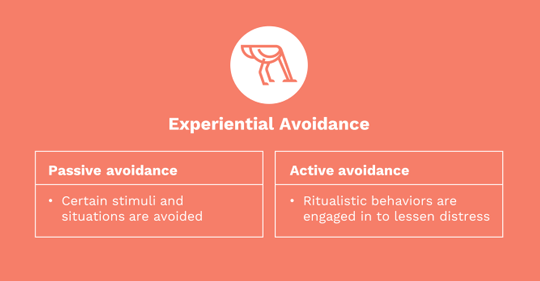
“The resolution to avoid an evil is seldom framed till the evil is far advanced, as to make avoidance impossible.” –Thomas Hardy
How do most people deal with unwanted experiences? They avoid them. They try to displace them with alcohol, drugs, half-truths, or lies, to themselves or others. Does it work? Possibly, at least temporarily, but not usually long-term. Depression, anxiety, fear, trauma, etc., still seem to find a place to reside, either in our emotions or thoughts.
Humans, it seems, have the unwillingness to stay in contact with their unwanted internal experiences. This attempt to eliminate or avoid unwanted feelings, sometimes quite normal feelings like sadness or anger, can have drawbacks. Avoiding emotional struggles can transform ordinary feelings into clinical issues. Experiential avoidance exacerbates these normal everyday problems (Moran, 2022).
Experiential Acceptance
The process of not simply noticing but embracing one’s experience without judgment or defense is known as experiential (or psychological) acceptance. This concept is essentially the antithesis of experiential avoidance. “Psychological acceptance typically goes hand-in-hand with cognitive distancing or defusion. In fact, some theorists argue that the process of distancing oneself from one’s distressing experience automatically leads to acceptance of that experience (Brown & Ryan, 2003).”
In experiential acceptance, there is no attempt to avoid one’s unwanted emotions. Instead, there is an acceptance of these experiences, in the service of making positive behavior changes consistent with one’s goals and well-being.
The definitional goal of acceptance as an emotion regulation strategy is not to change the experienced emotions, but to receive them without control attempts (Hayes, 2004; Kohl et al., 2012). Experiential avoidance seeks to control these unwanted experiences by displacing them with emotional regulation strategies that are counterproductive. They provide temporary relief at the expense of potential growth. They are the proverbial Band-Aid being applied externally in an attempt to manage an internal wound.
“It’s very easy to be judgemental until you know someone’s truth.” –Kate Winslet
Non-Judgemental Awareness
Harvard researchers found another key aspect of mindfulness involves acceptance and non-judgment of our present-moment experiences. This includes accepting our thoughts and feelings—whether positive or negative—and immersing ourselves in the present moment without evaluating it.
Observing life experiences without labeling them as right or wrong helps with being non-judgemental. Staying present-minded also keeps past experiences from encouraging a leap to judgment. Positive thinking is an attempt to chase the good instead of the bad.
Positive Thinking
Johns Hopkins expert Lisa R. Yanek, M.P.H., and her colleagues found positive people from the general population were 13% less likely than their negative counterparts to have a heart attack or other coronary event. Positive thinking has been linked to multiple benefits (Park, et al., 2016).
Better stress management, greater resistance to the common cold, longer life span, lower rates of depression, and enhanced psychological health are a few examples. Positive thinking has also been shown to reduce frailty during old age (Gale et al., 2017).
Chasing the good and not the bad seems to be a more productive pathway to mental and physical health. The good news is that these approaches of experiential awareness, non-judgemental awareness, and positive thinking are all readily available if we choose to implement them into our lives.
Personal Agency, Again
Avoiding experiential avoidance is, once again, a matter of personal agency. There are no special skills required. The personal agency only requires an individual’s ability to control their own behaviors and reactions to circumstances beyond their control, even if their actions are limited by someone else or something else.
The woman who is a victim of domestic violence only needs to decide what she needs to do for herself and her children. As she takes steps to change the situation (for example, by leaving her partner), she will likely experience anxiety, self-doubt, and other distressing experiences. It is the acceptance of these experiences, in this case in the service of making positive behavior changes consistent with her goals and well-being that constitutes experiential acceptance (Brown & Ryan, 2003).
References
Brown, K. & Ryan, R. (2003). The Benefits of Being Present: Mindfulness and Its Role in Psychological Well-Being. Journal of Personality and Social Psychology, 84(4): 822-48.
Gale CR, Mõttus R, Deary IJ, Cooper C, Sayer AA (2017). Personality and risk of frailty: The English Longitudinal Study of Ageing. Ann Behav Med. 2017;51(1):128-136.
Hayes S. C. (2004). Acceptance and commitment therapy, relational frame theory, and the third wave of behavioral and cognitive therapies. Behav. Ther. 35, 639–665.
Kohl A., Rief W., Glombiewski J. A. (2012). How effective are acceptance strategies? A meta-analytic review of experimental results. J. Behav. Ther. Exp. Psychiatry 43, 988–1001.
Moran, D.J. (2022). The Inflexahex Model in ACT: Acceptance vs Experiential Avoidance. Psychotherapy Academy, Dec. 8, 2022.
Park N, Peterson C, Szvarca D, Vander Molen RJ, Kim ES, Collon K. (2016). Positive Psychology and Physical Health: Research and Applications. Am J Lifestyle Med. 10(3):200-206.
